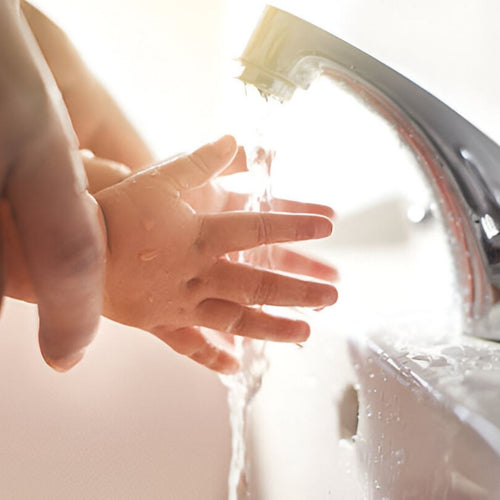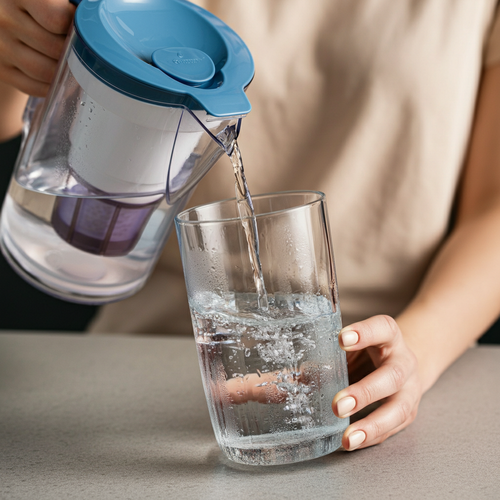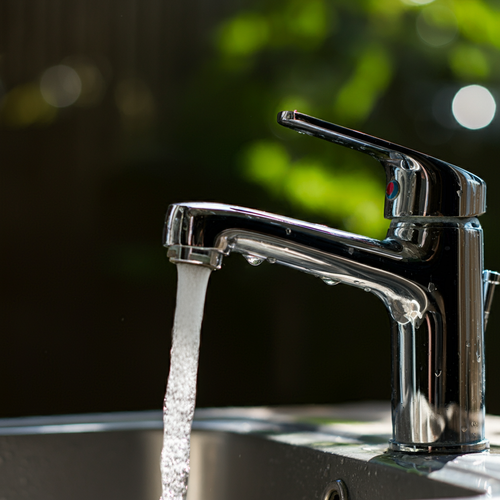Understanding Iron in Well Water
Who knew well water could be a little too friendly with iron? Well, turns out, quite a few of us have been there. Let's roll up our sleeves and figure out where this pesky metal hides and how we can live without a rusty aftertaste.
Sources of Iron Contamination
Iron in well water - not a surprise guest. Most of iron comes from the ground itself. You see, when it rains heavily or snow melts, water has a knack for dragging iron along with it as water saunters through the earth’s skin and into your well. Iron loves a good party and comes in three outfits: ferric, ferrous, and bacterial.
Of course, iron likes to crash from different sides too. Ancient old pipes and the rusty relics in your plumbing can sneak iron into your water without a sound. Ever found those brown bits floating in your water or orange art in your sinks? That’s iron’s modern art. Oh, and if your well casing is iron, prepare for a rusty encore.
Forms of Iron in Water
These iron types in water are like different personalities at a party:
-
Ferric Iron: The loud one you can't miss. Gives water a reddish or rusty shade; visible as those tiny particles you see floating around.
-
Ferrous Iron: The shy one, blending in. This one's invisible, colorless. But don't underestimate it - it revels in causing stains and tricky build-up when it plays with oxygen.
Getting to know these iron identities may just help you choose the perfect gadget or system to keep them out.
| Form of Iron | Characteristics | Visibility |
|---|---|---|
| Ferric Iron | Loud and reddish when oxidized | Visible |
| Ferrous Iron | Shy and colorless | Invisible |
The game of getting rid of iron starts with knowing which iron personality is lurking in your water. Pin that down, and voila, you can pick the water filtration system that fits like a glove.
Impact of Iron in Well Water
When you get iron in your well water, it can mess with your home's vibe and your health more than you'd think.
Staining & Discoloration
At just a smidge of 0.3 mg/L, iron starts showing off its talents with those lovely reddish-brown stains on your sinks and clothing (Illinois Department of Public Health on iron health facts). And believe us, these stubborn marks aren't just there to offend your eyes, they stick around like unwanted house guests.
| Iron Concentration (mg/L) | Impact |
|---|---|
| 0.3 | Some noticeable stains |
| 0.5 | More discoloration |
| 1.0 | We’re talking major stains here |
Iron's love affair with oxygen leads to rusty surprises in water pipes and faucets, giving your home a not-so-glamorous feel.
Effects on Health & Household

Bathing in iron heavy water? It might just turn your hair a lovely shade of orange and make it break like twigs. Not to mention, your skin might start playing tricks with a reddish glow or become a playground for eczema and acne. While drinking iron rich water won't usually make you sick, gulping down mountains of iron water can knock your system off balance.
Conditions like hemochromatosis could crop up, leading to exhaustion, weight drops, and liver issues, usually thanks to genetics—not from your water. So remove iron water from your list to stay away from these things.
Corrosion & Clogging
Iron doesn’t just stain your stuff; it’s a water pipe’s worst nightmare. Residue narrows water pipes, messes with your shower pressure, and cuts your appliances’ shine short. Clogs from iron make life less smooth, hike up repair bills, and iron can turn your water pipes into a playground for bacteria.
| Issue | Impact |
|---|---|
| Low Water Pressure | Everyday chores become a hassle |
| Jammed Pipes | Expensive fixes on the horizon |
| Worn-out Appliances | More dollars on energy and fixes |
| Bacteria Playground | Health hazards you don't want |
Considering these headaches, you might be itching to get rid of the iron water. Nabbing a solid iron-removal setup is more than a good idea—it's smart living for those who depend on well water.
Methods to Remove Iron in Well Water
Use the SoftPro Water Calculator to determine the most effective solution for removing iron from well water.
Tired of rusty water turning your whites to a lovely shade of tan? We've been there. Picking the right method to banish iron from your well water can feel like a big decision. Let's jump in and see how we can help you to get most effective solution for removing iron from well water.
Iron Removal System Overview
When it comes to removal of iron from your well water, imagine yourself as a kid in a candy store – so many choices! Here's a quick look at the better iron removal options:
✓ Iron Removal Plants
✓ Air Injected Iron Water Filter System
✓ Reverse Osmosis Water System
✓ Chemical and Biological Iron Removal Systems
✓ Clarifier Systems
Each of these is built to help lower iron levels, make water safer, and keep your home taps running clear water. As an user, you not need to focus on all services and method. Just find some and stick to them to get rid of iron water.
Most Effective Treatment Options & Considerations
Choosing an iron water system is a bit like picking the right pair of shoes – it needs to fit your needs perfectly. Keep in mind:
- Iron Concentration: First, figure out how much iron you've got hiding in your water. Home water testing kits can do the trick.
- Type of Iron: Iron comes in different flavors – ferric or ferrous. Knowing the type will guide you to the right solution.
- System Cost: Think about both the upfront cost and how much it'll cost you over time. Cheap systems could hit you with big upkeep bills.
- Ease of Maintenance: Nobody wants a hassle. Make sure there's a clear instruction manual and solid customer service for the water system.
- Additional Contaminants: If more than iron is lurking in your water, pick a system that can remove them in most effective way.
| Treatment Option | Iron Concentration | Initial Cost | Maintenance Frequency |
|---|---|---|---|
| Iron Removal Plants | High | $$ | Moderate |
| Iron Water Filter System | Moderate | $ | Low |
| Reverse Osmosis System | Low to Moderate | $$ | High |
| Chemical Iron Removal | High | $ | High |
| Biological Iron Removal | Moderate | $$ | Moderate |
| Clarifier Systems | High | $$ | Low |
Best Ways for Iron Removal
Want to get the most out of your iron removal system? Follow these handy tips and tricks:
- Regular Maintenance: Follow the owner's manual like it's a new cookbook. Regular check-ups and cleaning keep things running smoothly.
- Pre-Treatment Testing: Before diving in, test the waters. Know what you’re up against in terms of iron and other nasties. This is important before treatment as it show you clear picture and let's you find the step for future.
- Monitor Performance: Keep an eye on things by testing your water every now and then. Make sure that iron stays where it belongs – out of your water.
- Professional Installation: If you start feeling like you might need a Ph.D. just to set things up, maybe best to call in a pro.
- Customer Support: Opt for iron water removal systems with strong support teams and warranties. They'll be your lifeline if the unexpected happens.
Stick to these guidelines and you'll be sipping on pure, iron free water in no time. Cheers to clearer glasses and clothes that don't change color!
Best Ways of Choosing the Right Iron Filter
Picking the perfect iron filter for well water is essential to keep your home's water clean and safe. Let’s jump into the important stuff you need to know, why keeping things shipshape matters, and how iron filters and water softeners differ.
Jot These Down
When picking an iron filter, a few things deserve your attention to make sure you’re not just throwing money down the drain.
✓ What's in Your Water: Giving your h2o a once-over is key to knowing what nasties are lurking. Figuring out if you’re dealing with sneaky clear-water iron or its bold cousin, red-water iron, will steer your choice in the right direction.
✓ Filter's Guts and Grit: Make sure the filter’s size and speed can handle what your home demands. A teeny filter might let you down, while a behemoth could make your wallet weep.
✓ Smart Filtering: Get systems that zap the bad stuff without draining your bank account or wasting water.
✓ Drill Down with Testing: Getting granular with water tests sheds light on how bad things are, helping you grab the right filter for the job.
Here's a quick cheat sheet:
| Concern | What to Do |
|---|---|
| Water Type | Test to see what’s in it |
| Filter Size | Fit it to your water habits |
| Flow Rate | Check the match with your setup |
| Efficiency | Pick one that's a smart saver |
| Do A Test | Know what you’re tackling |
Keeping It Crisp
A little TLC goes a long way in keeping your water iron filter humming. Doing the grunt work like scrubbing, flushing, and swapping out stuff can make a big difference in how long your filter sticks around.
✓ Scrubbing Down: Regular sprucing up keeps blockages at bay so water keeps flowing smooth.
✓ Flush It Out: Getting those iron bits out keeps things efficient and steady.
✓ Freshen Up the Media: When the filter media reaches its limit, swapping it out is key to keep sucking up that iron nastiness.
Find a filter with a guide on upkeep, a good warranty, and solid backup in customer care; it's common sense in managing maintenance bills smartly.
| Task | When To Do It | Why |
|---|---|---|
| Scrub | Often | Keep it flowing |
| Flush | Follow the manual | Keep it efficient |
| Swap Media | As the clock ticks | Keeps iron removal top-notch |
Iron Filter vs. Water Softener
Even though they might seem like a tag team for well water, iron filters and water softeners have their own plays.
✓ Iron Well Water Filter: These bad boys are built to yank out iron and metallic things from your water. Some iron filters, like those fancy-pants manganese greensand ones, are whizzes for nabbing sneaky clear water iron (Minnesota Department of Health on Iron in Water).
✓ Water softener systems: Focuses on softening up the water by taking out minerals like calcium and magnesium. While they can snatch a bit of iron—up around 10 mg/L from water—they won’t replace an iron filter’s talent.
| What They Do | Iron Filter | Water Softener |
|---|---|---|
| Job | Ditch iron and metals | Ditch hardness bringers |
| Iron Muscles | Mighty | Up to moderate |
| Perfect For | Iron overload | Hard water horrors |
Knowing these tidbits and picking the right water iron filter means you’ll score clear and safe water for home sweet home.


















![Aldex Premium 10% Cross Link Resin for Water Softener [High Capacity]-SoftPro® Water Systems](http://www.softprowatersystems.com/cdn/shop/files/Aldex_10_Cross_Link_Resin_Premium_High_Capacity_for_Water_Softener_600x.jpg?v=1735853599)
























